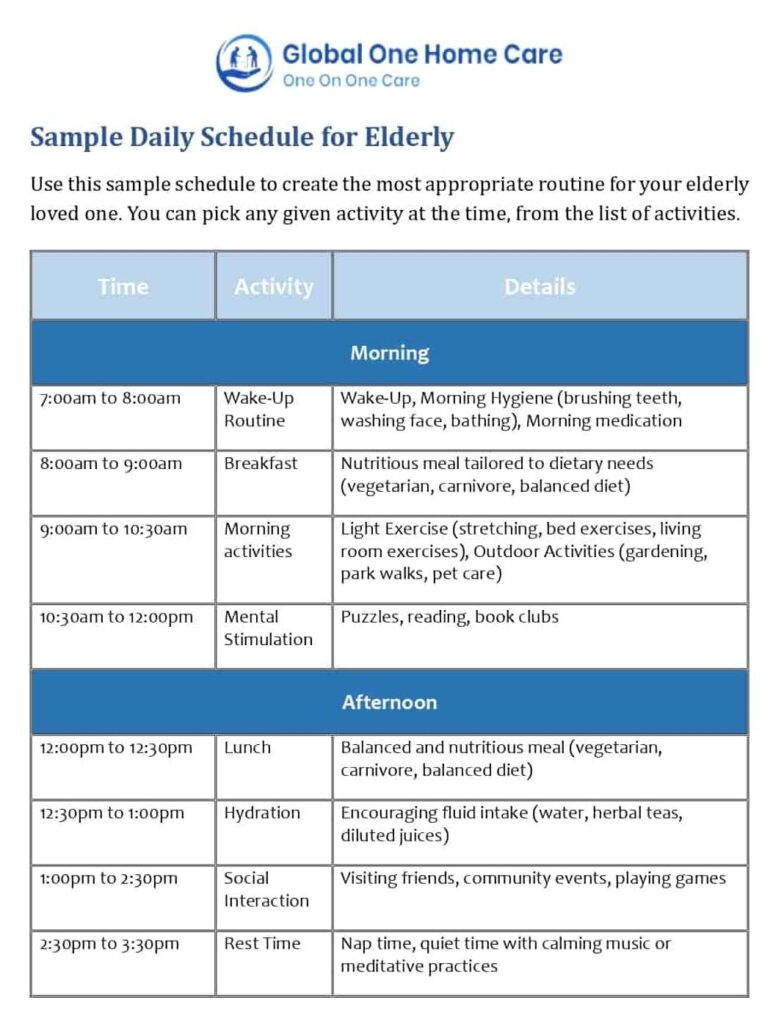As we age, the importance of establishing consistent daily care routines becomes increasingly evident. A well-structured routine not only enhances the overall well-being of seniors but also fosters independence and promotes a sense of stability. Whether you’re a caregiver, a family member, or a friend, understanding how to craft these routines is essential to ensuring comfort and support for older adults. In this article, we’ll explore essential tips for developing effective daily care routines tailored to the unique needs of seniors. From personal hygiene to meal planning and mental engagement, we’ll delve into strategies that empower seniors to maintain their dignity and quality of life. Join us as we navigate the intricacies of senior care, offering insights that can make a meaningful difference in their everyday lives.
Understanding the Unique Needs of Seniors in Daily Care Routines
When crafting daily care routines for seniors, it is essential to appreciate their unique needs, which can vary significantly due to factors such as health status, mobility, and cognitive function. Understanding these nuances allows caregivers to create routines that not only support physical well-being but also enhance emotional health. Consider the following key points to ensure that care routines are tailored effectively:
- Personal Preferences: Seniors may have specific likes and dislikes that should be honored in their routines.
- Comfort and Safety: Assessing the living environment for safety hazards is crucial to prevent falls and injuries.
- Health Conditions: Tailor daily activities to align with any chronic conditions or requirements for medication management.
In addition to physical considerations, emotional engagement plays a significant role in the overall well-being of seniors. Incorporating activities that stimulate cognitive function and provide social interaction can dramatically enhance their quality of life. Implement these strategies for a more enriching daily care routine:
- Social Activities: Encourage participation in group activities or maintain regular communication with family and friends.
- Cognitive Engagement: Include puzzles, reading, or card games to keep the mind active.
- Physical Exercise: Gentle exercises, like stretching or walking, should be integrated to maintain mobility and strength.
Key Components of a Balanced Daily Routine for Seniors
Creating a balanced daily routine for seniors is essential for maintaining physical health, mental well-being, and emotional stability. A well-structured day can include a mix of activities that promote engagement and personal fulfillment. Key components of such a routine might encompass:
- Physical Activity: Incorporating gentle exercises like walking, stretching, or yoga helps maintain mobility and strength.
- Nutrition: Ensuring balanced meals rich in nutrients supports overall health. Focus on vegetables, fruits, whole grains, and lean protein.
- Cognitive Engagement: Activities such as reading, puzzles, or learning new skills can keep the mind sharp.
- Social Interaction: Regular communication with friends and family, or participation in community activities, fosters a sense of belonging.
- Routine Rest: Quality sleep and scheduled downtime are crucial for rejuvenating energy and enhancing mood.
To help visualize a structured day, here is a simple table that outlines a sample daily routine for seniors. This framework can be tailored to individual preferences and needs:
| Time | Activity |
|---|---|
| 8:00 AM | Breakfast & Medication |
| 9:00 AM | Morning Walk |
| 10:00 AM | Cognitive Activities (Puzzles/Reading) |
| 12:00 PM | Lunch & Social Time |
| 2:00 PM | Rest/Nap |
| 3:00 PM | Hobbies (Gardening/Crafts) |
| 5:00 PM | Dinner & Family Time |
| 7:00 PM | Evening Relaxation (TV/Books) |
Incorporating Physical Activity and Mental Stimulation
Integrating physical activity into a senior’s daily routine can significantly enhance their overall well-being. Gentle exercises such as walking, swimming, or yoga can help improve mobility and balance, while also promoting cardiovascular health. To ensure that these activities remain engaging and safe, consider incorporating the following elements:
- Personalized Routine: Tailor activities based on the individual’s ability and preferences to ensure enjoyment and adherence.
- Social Interaction: Encourage group activities such as dance classes or tai chi, which can also foster a sense of community.
- Consistency: Establish a regular schedule, even if it involves short sessions, to build a habit of movement.
Meanwhile, to keep the mind active and engaged, it’s essential to introduce mental stimulation in various forms. Activities such as puzzles, reading, or playing musical instruments contribute to cognitive health. Consider including structured brain games or discussions that stimulate socialization. Helpful suggestions can include:
- Book Clubs: Organize regular meetings around a chosen book to promote discussion and thought sharing.
- Memory Games: Incorporate games that focus on recall and recognition to strengthen memory skills.
- Art & Craft Sessions: Encourage creative expression through painting or crafting, which also aids in fine motor skills.
| Activity Type | Benefits |
|---|---|
| Physical Exercise | Enhances mobility, balance, and heart health |
| Mental Challenges | Improves cognitive function and memory retention |
| Social Engagement | Fosters a sense of community and combats loneliness |
Ensuring Safety and Comfort in Daily Care Practices
When caring for seniors, it is vital to prioritize their safety and comfort during every aspect of daily routines. Start by creating a safe environment that minimizes risks. This can include:
- Assessing Tripping Hazards: Regularly check for loose rugs, electrical cords, and clutter.
- Installing Grab Bars: Place them in bathrooms and near staircases to provide additional support.
- Improving Lighting: Ensure all areas are well-lit, particularly stairwells and hallways.
- Using Non-Slip Mats: Position them in bathrooms and kitchens to prevent slips.
Equally important is to foster a sense of comfort and familiarity. Tailor routines to include activities that enhance well-being and mental engagement. Consider the following:
- Personalized Meal Plans: Integrate favorite foods while adhering to dietary needs.
- Routine Social Interactions: Schedule regular visits or calls with family and friends.
- Engaging Activities: Include puzzles, garden work, or arts and crafts that cater to their interests.
- Physical Exercise: Plan gentle exercises such as stretching or walking to maintain mobility.
In Conclusion
establishing a nurturing daily care routine for seniors is not only crucial for their physical health but also significantly enhances their emotional well-being and quality of life. By considering their individual needs, preferences, and abilities, caregivers can create a supportive environment that fosters independence and dignity. The tips outlined in this article serve as a foundational guide, but it is essential to continuously adapt and evolve these routines as circumstances change.
Remember, the goal is to promote a holistic approach that encompasses physical activity, mental stimulation, social interaction, and personal care. Engaging seniors in the process of creating their routines can lead to greater satisfaction and a sense of control over their lives. Each small effort contributes to a bigger picture of health and happiness.
We hope you find these insights helpful as you embark on the rewarding journey of caring for your loved ones. For more resources and guidance, feel free to explore our blog further, share your experiences in the comments, or reach out for personalized advice. Together, we can make a difference in the lives of seniors, ensuring that they not only age with grace but thrive in their golden years. Thank you for reading!






